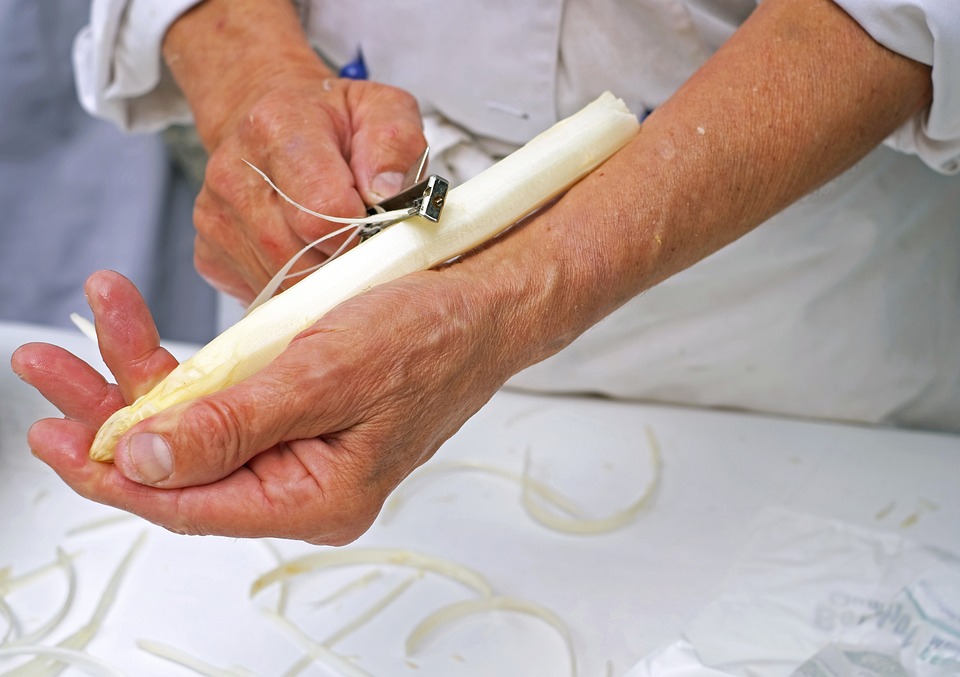
Low cost labour intensive vegetable production has been under strain in recent weeks. Tens of thousands of seasonal workers have moved from east to west – as they do each year. This year is not, however, a typical year. Covid19 has added new dimensions, while also shining a spotlight on an otherwise hidden army of harvesters. But is harvesting the white gold more valuable than the health of Romanian farm workers?
It’s early April 2020 when a friend posts a photo on his Twitter-account. The picture is taken at Cluj International Airport and shows hundreds of unprotected Romanians crowding into a cheap Eurowings-flight to Germany, where they will be employed harvesting asparagus or strawberries In fields now left empty. Germans celebrate their asparagus as ‘white gold’ and mark the beginning of the harvest season by festivals, while all around Berlin roadside shops pop up selling their fresh farm produce. Asparagus are quite the delicacy with some melted butter on top and fresh potatoes on the side.
Massive migration
Thousands of Romanian farm workers stampeding towards an airplane in the midst of a global pandemic is, however, a sight so disturbing it prompts the resignation of the airport manager in the end. But the massive seasonal migration from poor villages in Romania or Poland to the German hinterlands is not new. Every year farmers in the west of Europe rely on tens of thousands foreign workers from the East during spring harvest.
According to statistics of the Verband Süddeutscher Spargel- und Erdbeeranbauer e.V. (VSSE – a farmers’ association with members all over Germany) in 2019, a total of 1.660 German farmers harvested 130.563 tons of asparagus. During spring the demand for cheap manual labor on the fields can increase exponentially up to 85.000 workers in May – 90 percent of which consists of non-Germans.
When the highly contagious coronavirus hits Europe in the first months of 2020 the federal government in Berlin quickly decided to close international borders. German asparagus growers are caught completely out of leftfield. Without laborers the precious white gold might be left to rot in the field, they fear.
To compensate for the labor shortage German authorities first consider employing asylum seekers, students or people receiving social benefits in the field. But farmers have complaints about the fact that Eastern Europeans are better used to working hard in often still cold weather conditions and Germans often lack the agricultural skills needed to harvest asparagus. By the end of March Agricultural Minister Julia Klöckner (CDU) writes a letter to the German parliament to warn of the ‘enormous consequences on core production’ the lack of rural workers from Poland and Romania might have.
Chartered flights
To help farmers make it through the corona-outbreak the German government proposes a whole range of measures. The amount of days employers don’t have to pay social security for temporary workers is increased, lending money is made easier and authorities temporarily freeze the termination of land lease agreements in case a farmer would forfeit on his rent. Klöckner also decides to allow chartered flights of farm workers into the country under certain conditions. A concept paper seen by German magazine Der Spiegel states that Eastern-European workers will be allowed in by German authorities when travelling in groups and by plane. While the Romanian government is enforcing a strict curfew to halt the coronavirus spread – German authorities are asking authorities in Bucharest to grant exemptions to rural workers requesting to fly to Germany.
Farm organization Deutscher Bauernverband e.V. (DBV) quickly has set up a portal members must use to register foreign workers in, and shares all information with German police. By April Romanian workers start flocking into the country.
A spokesperson for the Berlin city airport of Schönefeld reassures Der Spiegel that all incoming passengers are checked for coronavirus before being allowed off airports grounds. A total of 40.000 foreign nationals can enter German territory in April to help harvest asparagus. Upon arrival at a farm, foreign workers are quarantined and not allowed to be in any contact with German nationals for 14 days.
UK from Bucharest
Germany is not the only European country with harvests at risk because border closings are keeping cheap labor their farms rely on out. Several EU-leaders have expressed the explicit wish to allow migrant seasonal agriculture workers to travel during a video conference on 26 March, Irish public broadcaster RTÉ reports. According to a VSSE-press statement not only asparagus growers, but also 80 percent of German farmers growing strawberries have begun running into labor shortages halfway through April.
Special charter flights have begun flying into the UK from Bucharest to help out British farms that would otherwise risk losing their crops of early summer fruit and vegetables – while Austria is even flying in care workers from the Bulgarian capital Sofia to order to keep hospitals sufficiently staffed.
Maintaining labour standards
Despite all the cheap labor flown in, German vegetable prices have risen by 27 percent from March to April. Trade unions are starting to notice discrepancies in the way Romanian and Polish workers are treated on farms in the west, demanding better pay, improved working conditions and decent coronavirus protection measures for seasonal workers flown in. In the Netherlands a group of migrant workers employed by a Romanian agency has already been quarantined after contracting coronavirus working in a meat processing plant.
A spokesperson of the German Working Group for Rural Agriculture (AbL) warns of the hollowing out of labor rights of seasonal workers during the corona-epidemic. German farmers’ organizations have at that point already filed requests to several ministries to ask for more leniency concerning daily working hours for temporary workers. ‘We value it very much that in many regions of Germany townspeople have offered to help out working on the land,’ the spokesperson comments. ‘Every bit of support German farmers receive strengthens us. But we also share a lot of responsibilities. We have to do everything in our power to ensure workers are paid fairly, have access to adequate health protections, can enjoy decent living conditions and are transported safely between fields instead of considering leveraging on labor rights during crisis times.’
Coping with Covid – Struggles and Resilience of Small-Scale Cheesemakers in Italy
IPES-Food on Covid-19: Protect the Vulnerable, Build Resilience, Stay Vigilant
Coping with Covid19 – Disruption, Protectionism and a People’s Agroecology
Effects of Coronavirus on Agricultural Production – a First Approximation
Effects of Coronavirus on Agricultural Production – a First Approximation (part 2)
Coping with Covid19 – Mutual Aid and Local Responses in a time of Coronavirus
Coping with Covid19 – Commoning as a Pandemic Survival Strategy
Coping with Covid19 – the Open Food Network and the New Digital Order(s)
Coping with Covid19 – Supply Chains and the Butterfly Effect
What will the World be like after Coronavirus? Four Possible Futures
Framing Farming – Nationalism, Food Security and Food Sovereignty
UK | Coronavirus Diary: the Virus That Did a No-Deal Brexit on our Food Supply
UK | Coronavirus: Rationing Based on Health, Equity and Decency now Needed
Coping with Covid19 – Tensions in Farming, Trade and the EU Institutions




